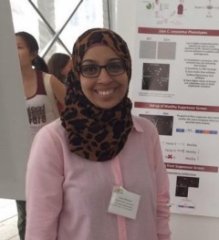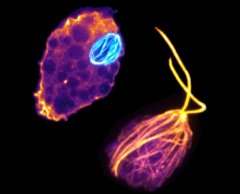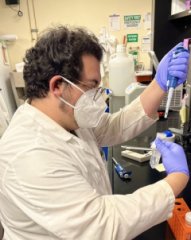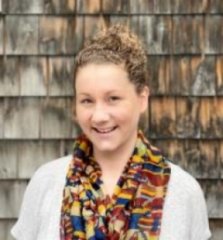News & Announcements
Pablo Visconti to Provide Distinguished Faculty Lecture and Receive Chancellor's Medal
Pablo Visconti to Provide Distinguished Faculty Lecture and Receive Chancellor's Medal
The University of Massachusetts Amherst is pleased to announce the Spring 2022 Distinguished Faculty Lecture Series and recipients of the Chancellor's Medal: Professors Pablo E. Visconti, Wayne Burleson and Lynnette Leidy Sievert.
The lecture series recognizes individual achievements and celebrates the values of academic excellence that we share as a community. The Chancellor’s Medal is the highest campus honor bestowed to members of the UMass faculty and will be presented at the conclusion of each lecture.
The lectures will be presented via Zoom.
Professor Pablo E. Visconti
Department of Veterinary and Animal Sciences
Thursday, March 3, 2022, 4 p.m.
Male Fertility and the Success of Assisted Reproductive Technologies
Thomas Sawyer PhD Dissertation Defense
Thomas Sawyer PhD Dissertation Defense
Wednesday, March 9, 2022
2:00 PM
Zoom
Dissertation Title: Human Saposin B Ligand Binding and Presentation to α-Galactosidase A
Advisor: Scott Garman
Samar Mahmoud PhD Dissertation Defense
Samar Mahmoud PhD Dissertation Defense
POSTPONED - new date, time and location to be announced
Dissertation Title: Principles of AAA+ Proteases
Advisor: Peter Chien
mRNA Holds Key to Next-Gen Vaccines and Therapeutics
mRNA Holds Key to Next-Gen Vaccines and Therapeutics
Like other scientists, Craig Martin, professor of chemistry at the University of Massachusetts Amherst, believes there is enormous potential in mRNA for both vaccines and therapeutics more broadly. Together with collaborators in UMass Amherst’s Department of Chemical Engineering, Martin is developing a new manufacturing process for RNA that promises to remove the key barriers that constrain its use in treating and preventing disease today. This, he said, would open doors to everything from personalized cancer treatments, to better therapies for genetic disorders like Tay-Sachs and cystic fibrosis, to the ability to quickly and inexpensively develop vaccines that could be deployed around the globe against the next pathogen to threaten public health.
For more than 30 years, Martin’s lab has studied the chemical mechanisms of RNA polymerase, an enzyme that controls the process of transcription; in which information from DNA is copied into a new molecule of mRNA. Several years ago, it pivoted to improving the process of RNA manufacturing to avoid the impurities from the start. Rather than using a traditional batch reactor to produce RNA—in which the components are mixed and sit for several hours—they wanted to create a flow reactor to enable chemical reactions in continuous, flowing systems. “The main benefit of this approach is that the RNA never sits around the enzyme for too long, preventing the secondary reaction,” that causes the impurity, said Martin.
On this endeavor, Martin has partnered with Sarah Perry, associate professor of chemical engineering, an expert in flow systems, and Shelly Peyton, professor of chemical engineering, whose work on biomaterials will be applied to the flow reactor. Perry and Peyton will work to refine and scale the initially developed smaller version of the process to be suitable for industrial uses.
This promising research has received support from the National Institutes of Health (NIH), the Massachusetts Technology Transfer Center, UMass Amherst’s Institute for Applied Life Sciences (IALS), and the Manning Innovation Program at UMass Amherst. In late 2021, it was also selected for funding from the Wellcome Leap R3 program, which seeks to create a global network of “biofoundries” capable of producing high quality, low-cost mRNA. Read more
What Brain-eating Amoebae Can Tell Us About the Diversity of Life on Earth and Evolutionary History
What Brain-eating Amoebae Can Tell Us About the Diversity of Life on Earth and Evolutionary History
An international team of researchers, including Katrina Velle, Lillian Fritz-Laylin and Patricia Wadsworth, recently announced in the journal Current Biology that an amoeba called Naegleria has evolved more distinct sets of tubulins, used for specific cellular processes, than previously thought. Their insight has a host of implications, which range from developing treatments for brain-eating infections to better understanding how life on earth evolved such enormous diversity.
Much of life on earth relies on a series of polymers called microtubules, composed of tubulin, to complete a wide range of tasks inside their cells. These microtubules are like the 2x4s of the cell and are used in everything from helping the cell to move, to transporting food and waste within the cell and giving the cell structural support.
Biologists had previously known that Naegleria uses a specific kind of tubulin during mitosis. But the new study, led by Katrina Velle, a postdoc in biology at UMass Amherst and the paper’s lead author, shows that Naegleria also employs three additional distinct tubulins specifically during mitosis. One pair of tubulins are used only during mitosis, while the other, the flagellate tubulin, specialize in cellular movement. The authors of the study then compared the tubulins and the structures they build to each other and those of more commonly studied species.
The research has been supported by a prominent, international set of institutions, including the National Institute of Allergy and Infectious Diseases of the National Institutes of Health, the National Institute of General Medical Sciences of the National Institutes of Health, the Smith Family Foundation Award for Excellence in Biomedical Science, the National Science Foundation, the Croatian Science Foundation, the European Research Council, the European Regional Development Fund—the Competitiveness and Cohesion Operational Programme: QuantiXLie Center of Excellence and IPSted, as well as the Robert A. Welch Foundation. Read more
UMass Amherst Research Advances Knowledge of the Battle Between Viruses and Human Cells
UMass Amherst Research Advances Knowledge of the Battle Between Viruses and Human Cells
In the long-term battle between a herpesvirus and its human host, a University of Massachusetts Amherst virologist and her team of students have identified some human RNA able to resist the viral takeover – and the mechanism by which that occurs.
This discovery, described in a paper published Feb. 17 in Proceedings of the National Academy of Sciences, represents an important step in the effort to develop anti-viral drugs to fight off infections.
“This paper is about trying to understand the mechanism that makes these RNA escape degradation,” says senior author Mandy Muller, assistant professor of microbiology. “The next step is to figure out if we can manipulate this to our advantage.”
How and why some RNA are able to escape the viral degradation are questions Muller’s team – including lead author and graduate student Daniel Macveigh-Fierro and co-authors and undergraduates Angelina Cicerchia, Ashley Cadorette and Vasudha Sharma – has been investigating. The research was supported by a $1.9 million Maximizing Investigators’ Research Award (MIRA) to Muller in 2020 from the NIH’s National Institute for General Medical Sciences. Read more
$2.8 million NIH Grant Funds Research Into Fatal Movement Disorders
$2.8 million NIH Grant Funds Research Into Fatal Movement Disorders
Researchers at the University of Massachusetts Amherst and Creighton University in Omaha have received a five-year, $2.8 million National Institutes of Health (NIH) grant to study the molecular mechanisms underlying multiple system atrophy (MSA), one in a group of fatal neurodegenerative movement disorders.
The research by lead investigator Amanda Woerman, assistant professor of biology in the UMass Amherst College of Natural Sciences, and Jason Bartz, professor and chair of medical microbiology and immunology at Creighton University, may also advance understanding of the biochemical roots of Parkinson’s disease and other synucleinopathies, which affect more than 6.8 million Americans.
In her years of research into the complexities of MSA, Woerman remains driven by the hope that her work will help lead to treatments.
“As a scientist, you have to be studying something that you find incredibly compelling,” she says. “I really can’t think of anything that I care more about in science than trying to alleviate the suffering that these patients and their families are going through.” Read more
Neurobiologist Collaborates in Research to Develop New Treatment Technology for Alzheimer’s Disease
Neurobiologist Collaborates in Research to Develop New Treatment Technology for Alzheimer’s Disease
Jennifer Rauch, assistant professor of biochemistry and molecular biology, is collaborating on a two-year, $700,000 National Institutes of Health grant to develop a new technology to treat Alzheimer’s disease, chronic traumatic encephalopathy and other neurodegenerative diseases.
Rauch will be working with grant recipient Novoron Bioscience, a San Diego-based biotechnology company that seeks to develop therapies to reverse central nervous system damage, and Kenneth Kosik of the University of California, Santa Barbara, in whose neurobiology lab Rauch conducted research as a post-doc.
Based at the Institute for Applied Life Sciences, whose mission is to translate science into technologies and services that benefit human health and well-being, the Rauch Lab focuses on the neurodegenerative protein tau, which aggregates in neurofibrillary tangles that are correlated with cognitive decline. With the NIH funding, Novoron will test new technology aimed at reducing the spread of tau by targeting LRP1, a cellular receptor for tau.
Rauch was the first author of a paper published in Nature that described the discovery of the central role of LRP1 in tauopathy. By targeting the molecule that regulates the transport and spread of tau within the brain, Novoron hopes to develop a novel, effective approach to treat Alzheimer’s disease, which affects some 25 million people worldwide, and other tauopathies. Read more
Timme-Laragy Lab Members Receive NESOT Awards
Timme-Laragy Lab Members Receive NESOT Awards
Doctoral student Madeline Tompach and postdoctoral research associate Emily Marques claimed top prizes at the annual meeting of the Northeast Chapter of the Society of Toxicology (NESOT) held virtually Dec. 1-3, 2021. They are both members of Associate Professor Alicia Timme-Laragy’s lab in the Department of Environmental Health Sciences.
MCB graduate student Tompach received the Graduate Student Oral Presentation Award, which includes a $1000 prize, for her presentation “Examining PFOS-induced Dyslipidemia and use of α-lipoic acid (ALA) as a Potential Mitigation Strategy in Zebrafish (Danio rerio).” Her research focuses on exposure to the pollutant PFOS which has been demonstrated to alter lipid profiles and stunt embryonic growth. She demonstrated that maternal consumption of the dietary supplement alpha lipoic acid (ALA) partially rescued the detrimental changes in embryonic growth caused by PFOS. Read more
Two UMass Amherst Professors Elected as Fellows to the American Association for the Advancement of Science
Two UMass Amherst Professors Elected as Fellows to the American Association for the Advancement of Science
The American Association for the Advancement of Science (AAAS), the preeminent scientific institution in the United States, the world’s largest general scientific society and publisher of the Science family of journals, has elected two professors from the University of Massachusetts Amherst to the newest class of AAAS Fellows, among the most prestigious honors bestowed by the scientific community.
Tricia Serio, associate chancellor for strategic academic planning, dean of the College of Natural Sciences and professor in the Department of Biochemistry and Molecular Biology, and Lynmarie Thompson, director of the Chemistry-Biology Interface Program and professor in the Department of Chemistry, will join 562 other scientists, engineers and innovators from 24 scientific disciplines in this year’s class of AAAS Fellows.
 Serio’s research is focused on a particular set of cellular proteins, called “prions,” that can change their shape. When their shape changes, so does their function within the cell, and sometimes these shape-shifting proteins can cause serious illness, such as Creutzfeldt-Jakob, Alzheimer’s and Parkinson’s diseases. “What we want to understand,” says Serio, “is why proteins change their shape, and if they can switch in one direction, causing disease, can they switch back to a healthy state?”
Serio’s research is focused on a particular set of cellular proteins, called “prions,” that can change their shape. When their shape changes, so does their function within the cell, and sometimes these shape-shifting proteins can cause serious illness, such as Creutzfeldt-Jakob, Alzheimer’s and Parkinson’s diseases. “What we want to understand,” says Serio, “is why proteins change their shape, and if they can switch in one direction, causing disease, can they switch back to a healthy state?”
 Thompson also studies cellular proteins, though the focus of her work is on proteins in the membrane of a cell. Membrane proteins are responsible for many of the cell’s processes, from harnessing energy to communicating with other cells and sensing the environment. Her lab investigates chemotaxis receptors that sense the environment and can direct the swimming of bacteria, and form protein arrays in the membrane that are “symmetrical and beautifully complex,” as Thompson puts it. Membrane proteins are also the targets for a wide range of therapeutic drugs—and yet their structures and mechanisms remain poorly understood.
Thompson also studies cellular proteins, though the focus of her work is on proteins in the membrane of a cell. Membrane proteins are responsible for many of the cell’s processes, from harnessing energy to communicating with other cells and sensing the environment. Her lab investigates chemotaxis receptors that sense the environment and can direct the swimming of bacteria, and form protein arrays in the membrane that are “symmetrical and beautifully complex,” as Thompson puts it. Membrane proteins are also the targets for a wide range of therapeutic drugs—and yet their structures and mechanisms remain poorly understood.
Serio and Thompson, both of whom are members of the graduate program in molecular and cellular biology at UMass, are also supported by the facilities and intellectual camaraderie of the UMass Institute for Applied Life Sciences (IALS), which combines deep and interdisciplinary expertise from 29 departments on the UMass Amherst campus to translate fundamental research into innovations that benefit human health and well-being. Read more







